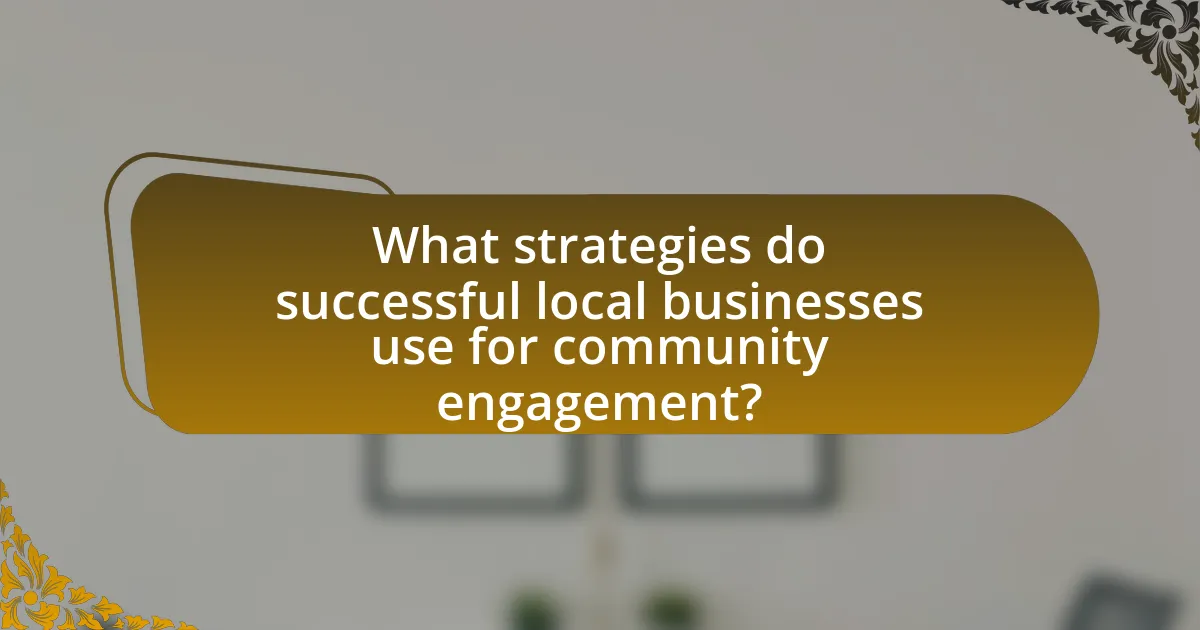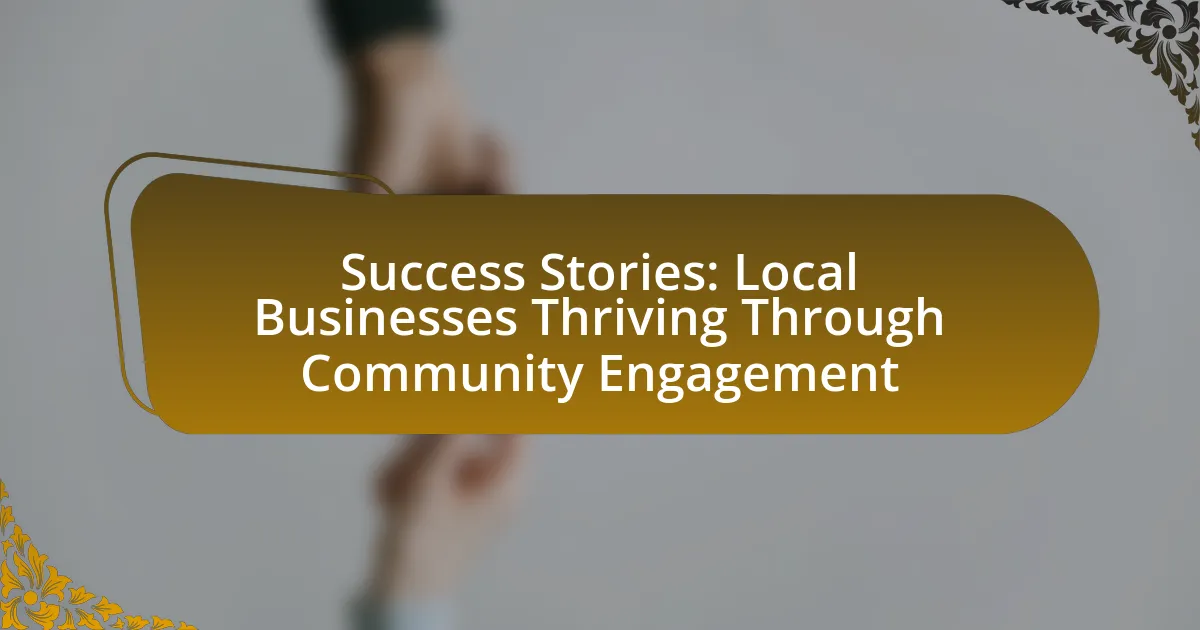Local businesses are increasingly thriving through effective community engagement strategies that foster connections and support within their neighborhoods. This article highlights success stories, such as a bakery that organized community events leading to a significant sales increase and a bookstore that launched a reading program for children, enhancing its role as a community hub. It explores how local businesses define community engagement, the activities that are most effective, and the metrics used to measure their efforts. Additionally, the article discusses the importance of community engagement for customer loyalty, the benefits gained by businesses, and innovative approaches to strengthen community ties. By examining these elements, the article provides insights into how local businesses can replicate successful engagement strategies to enhance their visibility and profitability.

What are Success Stories of Local Businesses Engaging with Their Communities?
Local businesses have successfully engaged with their communities through initiatives that foster connection and support. For example, a bakery in a small town organized weekly community events where residents could gather, share recipes, and participate in baking classes, resulting in a 30% increase in sales and a stronger customer base. Another success story involves a local bookstore that launched a reading program for children, partnering with schools to promote literacy; this initiative not only boosted foot traffic by 40% but also established the bookstore as a community hub. These examples illustrate how local businesses can thrive by actively participating in and supporting their communities, leading to mutual benefits.
How do local businesses define community engagement?
Local businesses define community engagement as active participation in local initiatives that foster relationships and support the community’s needs. This engagement often includes sponsoring local events, collaborating with non-profits, and providing resources or services that benefit residents. For instance, a study by the Small Business Administration found that businesses involved in community activities reported a 20% increase in customer loyalty, demonstrating the tangible benefits of such engagement.
What activities are considered effective in community engagement?
Effective activities in community engagement include organizing local events, facilitating workshops, and creating volunteer opportunities. These activities foster relationships between businesses and community members, enhancing trust and collaboration. For instance, local events like farmers’ markets or festivals not only promote local products but also encourage community participation, leading to increased foot traffic and sales for businesses. Workshops that address community needs, such as financial literacy or health awareness, empower residents and create a sense of ownership. Additionally, volunteer opportunities allow businesses to give back, strengthening their ties to the community and improving their public image. Research shows that businesses actively engaged in their communities experience higher customer loyalty and satisfaction, demonstrating the tangible benefits of effective community engagement activities.
How do local businesses measure their community engagement efforts?
Local businesses measure their community engagement efforts through various metrics such as customer feedback, social media interactions, and participation in local events. Customer feedback is often gathered through surveys and reviews, providing insights into community perceptions and satisfaction levels. Social media interactions, including likes, shares, and comments, serve as indicators of engagement and reach within the community. Additionally, tracking participation in local events, such as fundraisers or community service projects, helps businesses assess their involvement and impact. These methods collectively provide a comprehensive view of how effectively local businesses are engaging with their communities.
Why is community engagement important for local businesses?
Community engagement is crucial for local businesses because it fosters trust and loyalty among customers. When businesses actively participate in their communities, they create strong relationships that lead to repeat patronage and word-of-mouth referrals. According to a study by the American Express OPEN, 70% of consumers are more likely to support a business that is involved in local community initiatives. This engagement not only enhances the business’s reputation but also contributes to the overall economic health of the community, creating a mutually beneficial relationship.
What benefits do local businesses gain from engaging with their communities?
Local businesses gain increased customer loyalty and brand recognition from engaging with their communities. By participating in local events, supporting community initiatives, and fostering relationships with residents, these businesses create a sense of belonging and trust. Research indicates that 70% of consumers are more likely to support businesses that are actively involved in their communities, demonstrating that community engagement directly correlates with customer retention and sales growth. Additionally, local businesses often benefit from word-of-mouth referrals, which are amplified through community ties, further enhancing their market presence and profitability.
How does community engagement impact customer loyalty?
Community engagement significantly enhances customer loyalty by fostering a sense of belonging and trust between businesses and their customers. When businesses actively participate in their local communities, they create emotional connections that encourage repeat patronage. For instance, a study by the Harvard Business Review found that companies with strong community ties experience a 20% increase in customer loyalty compared to those without such engagement. This connection often translates into customers feeling more valued and understood, leading to higher retention rates and positive word-of-mouth referrals.
What are some notable examples of local businesses thriving through community engagement?
Local businesses such as The Coffee Shop in Portland and The Bookstore in Asheville have thrived through community engagement by actively participating in local events and fostering relationships with residents. The Coffee Shop hosts weekly open mic nights and art displays featuring local artists, which has increased foot traffic and customer loyalty. Similarly, The Bookstore organizes book clubs and author signings that engage the community, resulting in a 30% increase in sales over the past year. These examples demonstrate how local businesses can leverage community involvement to enhance their visibility and profitability.
How did these businesses implement their community engagement strategies?
These businesses implemented their community engagement strategies by actively participating in local events and collaborating with community organizations. For instance, they sponsored local sports teams, hosted workshops, and organized charity events, which fostered relationships with community members. Additionally, they utilized social media platforms to promote their initiatives and gather feedback, ensuring that their efforts aligned with community needs. This approach not only increased brand visibility but also built trust and loyalty among local consumers, as evidenced by increased customer engagement metrics and positive community feedback.
What challenges did they face and how did they overcome them?
Local businesses faced challenges such as limited resources, competition from larger corporations, and difficulties in building customer loyalty. They overcame these obstacles by leveraging community engagement strategies, such as hosting local events, collaborating with other small businesses, and utilizing social media to connect with customers. For instance, a local café organized community gatherings that not only increased foot traffic but also fostered a sense of belonging among residents, leading to increased customer loyalty and sales.

What strategies do successful local businesses use for community engagement?
Successful local businesses engage with their communities through strategies such as hosting events, collaborating with local organizations, and utilizing social media for outreach. Hosting events like workshops or community fairs fosters direct interaction and builds relationships with customers, enhancing brand loyalty. Collaborating with local organizations, such as schools or charities, allows businesses to contribute to community initiatives, which strengthens their reputation and visibility. Additionally, leveraging social media platforms enables businesses to communicate effectively with their audience, share local stories, and promote community events, thereby increasing engagement and customer connection. These strategies have been shown to improve customer retention and drive local sales, as evidenced by studies indicating that community-focused businesses often see a 20% increase in customer loyalty compared to those that do not engage locally.
How do local businesses build relationships within their communities?
Local businesses build relationships within their communities by actively engaging in community events and supporting local initiatives. For example, many businesses sponsor local sports teams or participate in charity events, which fosters goodwill and strengthens community ties. According to a survey by the Local Initiatives Support Corporation, 70% of consumers are more likely to support businesses that contribute to their community, demonstrating that community involvement directly correlates with customer loyalty and trust.
What role do partnerships with local organizations play?
Partnerships with local organizations play a crucial role in enhancing community engagement and driving business success. These collaborations enable local businesses to leverage the resources, networks, and expertise of established organizations, fostering mutual growth. For instance, a study by the National League of Cities found that businesses involved in community partnerships reported a 20% increase in customer loyalty and a 15% rise in sales, demonstrating the tangible benefits of such alliances. By working together, local businesses and organizations can address community needs more effectively, creating a supportive ecosystem that benefits all stakeholders involved.
How can businesses leverage social media for community engagement?
Businesses can leverage social media for community engagement by actively interacting with their audience, sharing relevant content, and fostering a sense of belonging. Engaging with customers through comments, messages, and posts allows businesses to build relationships and trust, which is essential for community engagement. For instance, a study by Sprout Social found that 70% of consumers feel more connected to brands with a strong social media presence. Additionally, businesses can create community-focused content, such as local events or initiatives, which encourages participation and strengthens community ties. By utilizing targeted advertising on platforms like Facebook and Instagram, businesses can reach specific demographics, enhancing their engagement efforts.
What innovative approaches have local businesses taken to engage their communities?
Local businesses have adopted innovative approaches such as hosting community events, utilizing social media for engagement, and collaborating with local organizations to foster community ties. For instance, many businesses organize workshops, farmers’ markets, or charity events that not only promote their products but also bring residents together, enhancing local culture and community spirit. Additionally, businesses leverage social media platforms to create interactive campaigns, encouraging community feedback and participation, which strengthens customer loyalty and engagement. Collaborations with local nonprofits or schools for fundraising or educational initiatives further demonstrate how businesses can effectively engage their communities while contributing to local causes.
How do events and sponsorships enhance community ties?
Events and sponsorships enhance community ties by fostering connections among residents and local businesses. These activities create opportunities for social interaction, collaboration, and shared experiences, which strengthen the sense of belonging within the community. For instance, community festivals and sports events often attract diverse groups, encouraging participation and engagement. According to a study by the National Endowment for the Arts, community engagement through events can lead to increased civic involvement and improved social cohesion. Furthermore, when local businesses sponsor events, they demonstrate their commitment to the community, which can enhance customer loyalty and support. This reciprocal relationship between businesses and the community ultimately leads to a more vibrant and interconnected social fabric.
What unique programs have been developed to foster community involvement?
Unique programs developed to foster community involvement include local business partnerships with schools for educational initiatives, community clean-up events organized by businesses, and collaborative festivals that celebrate local culture and artisans. These programs enhance community ties and promote local economic growth. For instance, a study by the National Main Street Center found that businesses participating in community events saw a 20% increase in customer engagement, demonstrating the effectiveness of such initiatives in strengthening community bonds.

How can other local businesses replicate these success stories?
Local businesses can replicate success stories by actively engaging with their communities through tailored initiatives and partnerships. For instance, businesses can host local events, collaborate with nearby organizations, and support community causes, which fosters goodwill and strengthens customer loyalty. Research indicates that businesses involved in community engagement see a 20% increase in customer retention rates, highlighting the effectiveness of such strategies. By implementing similar community-focused approaches, local businesses can enhance their visibility and build lasting relationships with customers.
What steps should local businesses take to start engaging with their communities?
Local businesses should start engaging with their communities by actively participating in local events and initiatives. This involvement can include sponsoring community events, collaborating with local organizations, and hosting workshops or classes that cater to community interests. For instance, a study by the American Express OPEN Small Business Saturday Consumer Insights found that 67% of consumers believe that small businesses contribute positively to their community, highlighting the importance of local engagement. By fostering relationships with community members and other businesses, local enterprises can enhance their visibility and build a loyal customer base.
How can businesses identify their target community and its needs?
Businesses can identify their target community and its needs by conducting thorough market research, including surveys, focus groups, and analyzing demographic data. This approach allows businesses to gather insights directly from potential customers about their preferences, behaviors, and pain points. For instance, a study by the Pew Research Center found that 70% of consumers prefer brands that understand their needs, highlighting the importance of tailored engagement. Additionally, utilizing social media analytics can provide real-time feedback on community interests and trends, further refining the understanding of the target audience.
What resources are available for businesses looking to enhance community engagement?
Businesses looking to enhance community engagement can utilize various resources, including community engagement platforms, local partnerships, and social media tools. Community engagement platforms like Nextdoor and Meetup facilitate connections with local residents and organizations, allowing businesses to promote events and initiatives. Local partnerships with schools, nonprofits, and community groups can provide opportunities for collaboration and outreach, fostering a sense of community involvement. Additionally, social media tools such as Facebook and Instagram enable businesses to share their community-focused activities and engage directly with their audience, enhancing visibility and interaction. These resources collectively support businesses in building stronger relationships within their communities.
What best practices can local businesses follow for effective community engagement?
Local businesses can follow several best practices for effective community engagement, including building relationships, participating in local events, and leveraging social media. Establishing strong relationships with community members fosters trust and loyalty, which are essential for long-term success. Participating in local events, such as fairs or charity drives, allows businesses to connect with residents and demonstrate their commitment to the community. Additionally, utilizing social media platforms enables businesses to communicate directly with customers, share updates, and promote community initiatives, enhancing visibility and engagement. These practices are supported by studies showing that businesses actively involved in their communities experience increased customer loyalty and brand recognition.
How can businesses evaluate the success of their community engagement initiatives?
Businesses can evaluate the success of their community engagement initiatives by measuring specific metrics such as community feedback, participation rates, and social media engagement. For instance, surveys can be conducted to gather direct feedback from community members about their perceptions and experiences with the initiatives. Additionally, tracking participation rates in events or programs can provide quantitative data on engagement levels. Social media analytics can also reveal how well the initiatives resonate with the community, as metrics like shares, likes, and comments indicate public interest and support. According to a study by the Harvard Business Review, companies that actively engage with their communities see a 20% increase in customer loyalty, underscoring the importance of effective evaluation methods.
What common pitfalls should businesses avoid in their engagement efforts?
Businesses should avoid the common pitfalls of neglecting audience feedback, failing to personalize communication, and lacking consistency in engagement efforts. Neglecting audience feedback can lead to misalignment with customer needs, as studies show that 70% of customers prefer brands that listen and respond to their feedback. Failing to personalize communication results in lower engagement rates; research indicates that personalized emails can increase click-through rates by 14% and conversions by 10%. Lastly, inconsistency in engagement can damage brand trust; according to a survey, 60% of consumers expect consistent interactions across all channels.
What are the key takeaways for local businesses aiming to thrive through community engagement?
Local businesses aiming to thrive through community engagement should prioritize building authentic relationships, actively participating in local events, and supporting community initiatives. Establishing genuine connections fosters trust and loyalty among customers, which is essential for long-term success. For instance, a study by the American Express 2019 Small Business Saturday Consumer Insights revealed that 70% of consumers believe supporting local businesses strengthens the community. Additionally, involvement in local events, such as farmers’ markets or charity fundraisers, enhances visibility and demonstrates commitment to the community. Supporting local initiatives not only boosts brand reputation but also aligns the business with community values, further solidifying customer loyalty.
